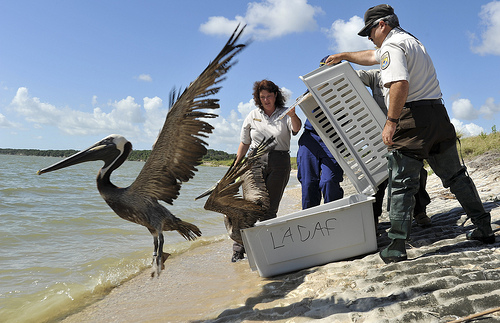Small Businesses and the Gulf Coast Oil Spill: Do you have a Disaster Plan for your Business?
Topic: How-to,Managing Your Business | Comments (2)
Susan Spicer, the New Orlean’s Chef who’s become the unwitting poster child for small businesses in the Gulf region effected by the oil spill, gave her first interview yesterday about her decision to file suit with the New York Times Diner’s Journal.
“We are already seeing casualties right and left, human causalities, business casualties, cultural casualties,” she said in the interview.
As someone who lived in New Orleans, I understand the myriad ways that the oil spill is damaging the small business community in that region. The first to be affected were the Fisherman, who were immediately placed in peril by the ban on finishing. There was no immediate impact on the cost and availability of seafood and experts predicted that a speedy resolution could prevent economic ripples.
Unfortunately the situation continues without a solution, and the economic impact of the spill continues to ripple outward taking new businesses in it’s wake. As Spicer emphasizes, the local culinary map is built on showcasing fresh caught local seafood. Now, what little uncontaminated ingredients are available are prohibitively expensive, and even then people are scared to eat these ingredients for fear of contamination both from the oil and the chemicals used for clean up. This is having a more immediate effect, and rendering more casualties, among the smaller businesses and restaurants that lack the resources to withstand these circumstances.
Even as the Federal Government and the Small Business Association step in with loans, State Governments join the Hotels, shrimpers and now restaurants looking to BP to compensate for the loss of revenue caused by the spill. Meanwhile, further hardships loom as the hurricane season begins in the coming months, threatening even more harm to businesses that are still weakened from the damage wrought by four massive hurricanes in the last five years.
These small businesses are as much a victim of the spill as the poor sea creatures, who’s oil covered visages populate the media’s consciousness.
Small businesses are the most vulnerable to these kinds of unpredictable disasters, lacking the resources and reserves to sustain them through loss in revenue and unexpected increases in cost of supplies.
Does your business have a disaster plan in place? Being prepared and having a plan can go a long way to helping your business survive unforeseen challenges. Below are some resources to help you build a plan for your business should disaster strike:
How to Build a Disaster Plan for Your Business
How to Create a Business Continuity Plan (Also Known as a Disaster Recovery Plan)

Pingback: Hold Pls: Little Animals not the Only Victim of Oil Spill « Hold Pls()
Pingback: Tweets that mention Small Businesses and the Gulf Coast Oil Spill: Do you have a Disaster Plan for your Business? | WorkingPoint -- Topsy.com()